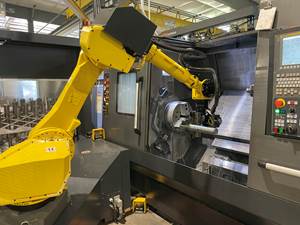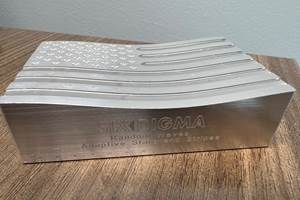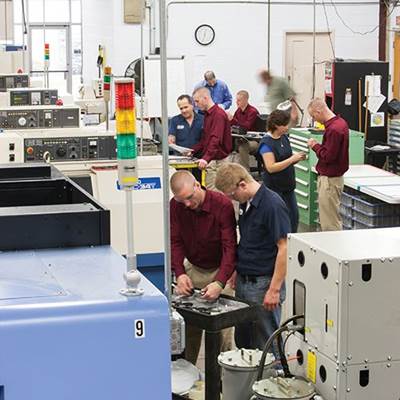The Inside Track
For many shops, the best source of new business is existing customers. Is the best source of new talent your existing employees?
Share





With the cover story in the January 2014 issue of 91ÊÓƵÍøÕ¾ÎÛ, we give prominent attention to a small shop pursuing a seemingly straightforward idea. Progressive Turnings, a Chicago-area contract turning shop, is improving its capabilities by developing its current employees. Helping those employees obtain a more engaged understanding of the shop’s processes is important enough to Progressive that the shop routinely pulls employees out of production in order to spend time on this training.
The commitment is worth highlighting because this practice is not part of the habits or culture of many manufacturing facilities. Yet I believe it increasingly will be.
After all, in the typical shop today, it is no accident that the current employees are still employed. For many machining businesses, the bottom fell out five years ago. Shops cut practically all the personnel they could. The employees who remained were kept because of their skills, perhaps—but often also because these were the employees who just fit. The capacity is hard to frame in a job description, but certain employees just innately conform to the priorities of the particular company and the subtle ways those priorities shape the performance of the employee’s job. When harsh business conditions demand a process in which every remaining employee does a little more, this innate understanding is vital. It becomes even more vital later, when the company tries to advance and grow while still holding onto some of the virtues of its leanness.
The very same thing has been happening in shops’ customer relationships as well. Today, it has become more difficult for job shops to pick up serious and significant new customers, because each prospective customer tends to have already settled on a core of established suppliers. To each of these customers, those few shops are the ones that, again, just fit with the way that customer wants to proceed. These shops get the hard details right (tolerances and deliveries), but they also get the soft details right, somehow anticipating the proper moments to help the customer in ways that go beyond the formal requirements of each job. The customer company can remain lean by leaning on suppliers such as these.
The result of this tendency has been a move toward greater integration. Plenty of contract shops now thrive and grow off their close relationships with just five or six good customers. These shops succeed because they “get it” within their very narrow markets, so it stands to reason that they would increasingly need employees who are also able to “get it” within the shop cultures that result from serving these narrow markets.
For many shops today, the most promising source of new business is their current customers. Their best opportunities are found in the hope of growing with these companies. Likely this has always been true, but today it’s truer than ever.
Progressive has now found the extension of that idea. Namely, the most promising source of new talent is likely to be found in the undeveloped potential of those employees who are already succeeding in the shop.
Related Content
Same Headcount, Double the Sales: Successful Job Shop Automation
Doubling sales requires more than just robots. Pro Products’ staff works in tandem with robots, performing inspection and other value-added activities.
Read MoreShop Tour Video: You've Never Seen a Manufacturing Facility Like This
In the latest installment of our “View From My Shop” series, explore Marathon Precision’s multi-process approach to manufacturing, where blacksmiths and hand-forged dies meet state-of-the-art CNC machining. Discover how restoring classic muscle cars and building custom art projects creates a dynamic shop culture — and draws top talent to this unique and innovative metalworking facility.
Read MoreInside Machineosaurus: Unique Job Shop with Dinosaur-Named CNC Machines, Four-Day Workweek & High-Precision Machining
Take a tour of Machineosaurus, a Massachusetts machine shop where every CNC machine is named after a dinosaur!
Read MoreBuilding Machines and Apprenticeships In-House: 5-Axis Live
Universal machines were the main draw of Grob’s 5-Axis Live — though the company’s apprenticeship and support proved equally impressive.
Read MoreRead Next
Human Capital
This shop’s attention to process improvement led it to recognize and appreciate the largest source of unrealized potential in the company: the employees. Now, employee improvement is a priority in the plant manager’s role, and training has become a systemized part of the process.
Read MoreMachine Shop MBA
Making Chips and 91ÊÓƵÍøÕ¾ÎÛ are teaming up for a new podcast series called Machine Shop MBA—designed to help manufacturers measure their success against the industry’s best. Through the lens of the Top Shops benchmarking program, the series explores the KPIs that set high-performing shops apart, from machine utilization and first-pass yield to employee engagement and revenue per employee.
Read MoreAMRs Are Moving Into Manufacturing: 4 Considerations for Implementation
AMRs can provide a flexible, easy-to-use automation platform so long as manufacturers choose a suitable task and prepare their facilities.
Read More



















